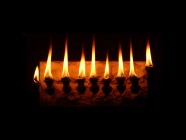A few months ago, I met Noam, an inspiring Israeli high-school student. After my lecture he approached me and explained how in his school, he is seen as a traitor and as an unpatriotic Israeli. Noam explained that he is very much a patriotic Israeli, and out of his love for Israel, he wants to see peace with the Palestinians.

The Israeli right's eulogies for the South African freedom fighter ranged from unawareness to hypocrisy. Even
if there is not full symmetry between apartheid and the occupation, Israel still stands for everything Mandela
fought against
Why aren't the Netanyahus going to Nelson Mandela's funeral? The reason is surely not the high costs of the flight
(after all, the budget for the couple's attendance of Thatcher's funeral was found without difficulty) nor a sudden
fit of humility. Yet still, the Prime Minister is looking for any excuse to avoid standing next to the world's
leaders to pay last respects to the man who fought and defeated the apartheid regime - and he knows why.
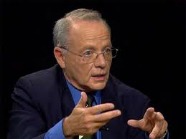
Veteran Israeli political analyst Akiva Eldar was the guest of an APN briefing call on December 9th, commenting on the Israeli-Palestinian negotiations, about the West's interim agreement with Iran, and about the impact of the two processes on US-Israeli relations

We Israelis often complain that 'there is no one to talk to.' But for many young Palestinians, Israelis are a
lost cause - and anti-normalization means there is less interaction than ever to prove this wrong.
By Ori Nir
I recently met with a group of about a dozen young reporters and photojournalists from the West Bank. I asked them
whether they had any contacts with Israeli journalists and was shocked to hear they did not. I told them that when
I covered Palestinian affairs for Haaretz in the 1980s and '90s, Palestinian journalists were my primary sources -
and my good friends. Back then, journalists on both sides of the Israeli-Palestinian divide sought contact with
each other, first and foremost because they thought their readers needed and wanted to know about their neighbors.
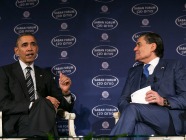
This week, Alpher discusses the seemingly significant high-level developments and statements regarding both the Israel-Arab peace process and Iran, against the backdrop of Israeli-American relations, how does the American security plan or "thoughts" challenge Netanyahu's security concept regarding the Jordan Valley, what is the significance of Obama's mention of a framework agreement as a negotiating outcome, what is the significance of Netanyahu's linkage of Iran and the two-state solution at the Saban Forum, and thoughts on Nelson Mandela's support for the Palestinians and consistent criticism of Israel.
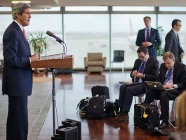 Secretary of State John Kerry confirmed today that General John Allen, The Obama administration's
special security envoy to the Israeli-Palestinian peace negotiations, briefed Israeli and Palestinian leaders on
the perception of the US regarding security arrangement on the way to achieving a two-state solution as well as
the security regime that would characterize a future Palestinian state.
Secretary of State John Kerry confirmed today that General John Allen, The Obama administration's
special security envoy to the Israeli-Palestinian peace negotiations, briefed Israeli and Palestinian leaders on
the perception of the US regarding security arrangement on the way to achieving a two-state solution as well as
the security regime that would characterize a future Palestinian state.
Speaking to reporters at Israel's Ben Gurion airport, before leaving the region back to the US, Kerry said that Allen's briefing was based on an analysis produced by the US security team that General Allen heads.
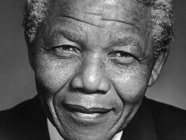
Americans for Peace Now (APN) mourns the death of Nelson Mandela, an iconic leader and an inspiration for
peace-seekers worldwide.
APN's President and CEO Debra DeLee said: "Nelson Mandela demonstrated that peace and reconciliation are possible
even in the most intractable conflicts, even when hope for resolution seems distant. Mandela has shown that with
enough resolve and courage, bold leaders can do what is the unthinkable.

This week, Alpher discusses whether Salafist Islamist terrorists in the West Bank is another sign of escalation toward a third intifada, if Netanyahu is inciting Congress and American Jewish leaders against Obama in the wake of the Geneva agreement with Iran, and what's behind the sharp protests by Druze and Bedouin--minorities who generally serve in the IDF.
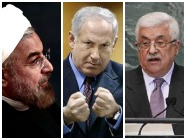
This week, Alpher discusses whether the Geneva agreement between the P5 + 1 and Iran is a "bad deal" and a "historic mistake" as Netanyahu argues, what about it should realistically worry Israel, what we have learned over the weekend regarding Israel's relationship with the Obama administration, whether Netanyahu's strategy regarding Iran and the international community has failed, what all this may say about the election in recent days of Yitzhak "Boozhi" Herzog to head the Labor party, and whether Netanyahu's invitation to Palestinian President Abbas to speak to Israel's parliament his inviting himself to a reciprocal appearance in the Palestinian parliament is a serious initiative.
